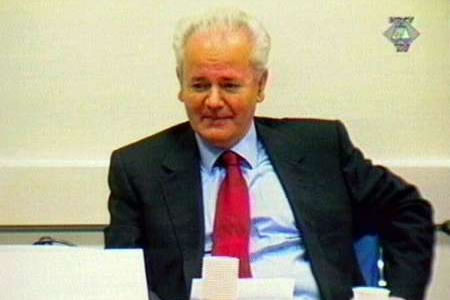Home
MILOSEVIC TRIAL ADJOURNED UNTIL 12 OCTOBER
A four-week break is arranged so assigned counsel can prepare for the continuation of trial and the examination of defense witnesses. Is the refusal of Milosevic's witnesses to come to The Hague “spontaneous” or “orchestrated”? Defense application for additional medical examinations and a change in the order in which defense witnesses are called denied.
 Slobodan Milosevic in the courtroom
Slobodan Milosevic in the courtroom The trial of Slobodan Milosevic adjourned for four weeks and will continue on Tuesday, 12 October. As he delivered the Trial Chamber’s decision, Presiding Judge Robinson specified that the adjournment was granted to give the defense enough time to conduct investigations and to prepare witnesses for trial, not for the reasons defense counsel Steven Kay cited. He wanted the trial adjourned until the Appeals Chamber rules on the accused’s appeal against the decision to assign him counsel.
Today the Chamber also denied two other applications made by Steven Kay: one to have the accused undergo additional medical examinations; the other to allow him to conduct the examination-in-chief, with assigned counsel asking additional questions after he is finished.
Judge Robinson stated that the order assigning counsel to Slobodan Milosevic was not issued on the basis of a single medical examination but of his entire case history; the cardiologists, having studied it, concluded that his condition was chronic and that it would deteriorate if he were to be exposed to strain and stress. If he were allowed to conduct the examination-in-chief now, judges believe, it would necessarily result in a deterioration of his health and new adjournments in the trial.
The Chamber’s decisions came after three hours of debate focusing on problems that Milosevic's defense had with witnesses. Of the initial list of 48 witnesses submitted by Milosevic's associates, the defense managed to call and examine only three. Twenty-three other potential witnesses were contacted: 20 of them refused to come and testify, two agreed to come to The Hague, and one remains undecided. Those who refused to come said they wanted to answer questions put by Milosevic, not his assigned counsel.
Kay could not answer Judge Bonomy’s question whether the witnesses’ refusal to come when summoned by the defense was "orchestrated or spontaneous." In the opinion of prosecutor Geoffrey Nice, the issue is quite clear: "The accused defies this Tribunal and encourages his witnesses to defy it, too…. The accused and his witnesses want to control the proceedings before this Tribunal."
Milosevic's persistent refusal to get involved in the questioning of witnesses and start instructing his assigned counsel, despite repeated calls by judges to do so, were compared by Nice with his behavior at the Peace Conference in The Hague in 1991, when he was the only one to reject the so-called Carrington Plan. The court, in Nice's view, "cannot go that far to accommodate the accused who is determined to go his own way… although it will not do him any good."
Judge Bonomy also noted that Milosevic was going against his own interests. In his view, "when one is given every reasonable chance to present one's defense and yet one refuses to do so, no one can say that the trial has not been fair."
Milosevic indignantly refused any suggestions that he might be influencing defense witnesses in any way, but managed to avoid "encouraging" them to come to The Hague, as Judge Bonomy suggested. "They are reasonable people, people of integrity, and it is their own decision," Milosevic replied.
As he again demanded his right to defend himself, Milosevic read extracts from several "telegrams expressing support" he received over the past few days from former diplomats in Canada and the US and from a former Soviet premier condemning the decision to assign him counsel and accusing the Tribunal of conducting a "Stalin-type trial."
The Appeals Chamber should rule on the appeal filed by British lawyer Steven Kay on behalf of the accused against the decision to assign him counsel.
Linked Reports
- Case : Milosevic Slobodan - "Kosovo, Croatia and Bosnia"
- 2004-09-14 VERIFIER VS. VERIFIER
- 2004-09-14 HEARING ON THE MOTION TO SUSPEND MILOSEVIC TRIAL TO BE HELD TOMORROW
- 2004-09-10 MILOSEVIC DAMAGING HIS OWN INTERESTS?
- 2004-09-23 MILOSEVIC THE DEFENSE COUNSEL GIVES RISE TO THE RISK OF UNFAIRNESS IN THE TRIAL OF MILOSEVIC THE ACCUSED
- 2004-09-30 KAY DEMANDS HEARING ON THE APPEAL CHALLENGING DECISION TO ASSIGN COUNSEL
- 2004-10-12 TESTIMONY ABOUT THE WAR THAT WAS "STAGED" IN KOSOVO
